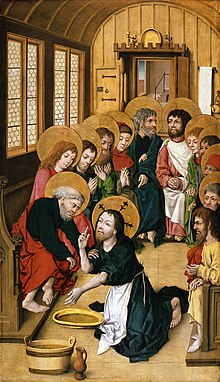
| Part of a series on |
| Christianity |
|---|
 |
Maundy (from Old French mandé, from Latin mandatum meaning "command"),[1] or Washing of the Saints' Feet, Washing of the Feet, or Pedelavium or Pedilavium,[2] is a religious rite observed by various Christian denominations. The word mandatum is the first word of the Latin Biblical quotation sung at the ceremony of the washing of the feet: "Mandatum novum do vobis ut diligatis invicem sicut dilexi vos", from the text of John 13:34 in the Vulgate ("I give you a new commandment, That ye love one another as I have loved you", John 13:34). The ceremony commemorates the commandment of Christ that his disciples should emulate his loving humility in the washing of the feet (John 13:14–17). The medieval Latin term mandatum (mandé, maundy), came to apply to the rite of foot-washing on the Thursday preceding Easter Sunday, known in English as "Maundy Thursday" since at least 1530.[3]
John 13:2–17 recounts Jesus' performance of this action. In verses 13:14–17, Christ instructs His disciples:
If I then, your Lord and Teacher, have washed your feet, you also ought to wash one another's feet. For I have given you an example, that you should do as I have done to you. Most assuredly, I say to you, a servant is not greater than his master; nor is he who is sent greater than he who sent him. If you know these things, blessed are you if you do them.
— John 13:14–17 (NKJV)
The Early Church practiced footwashing prior to the receiving of the Eucharist, and the rite was recorded early in the third century by the Christian apologist Tertullian, who discussed it involving a basin of "water for the saints' feet", along with a "linen towel".[4]: 98 [5]
Many Christian denominations throughout Church history have practiced foot washing as a church ordinance, including Adventists, Anabaptists (such as Conservative Mennonites and the Dunkard Brethren, Free Will Baptists, Missionary Methodists, and Pentecostals.[1][6] Of these, certain denominations, such as the Dunkard Brethren Church, regularly practice feetwashing as part of the lovefeast, which includes the holy kiss, feetwashing, communion, and a communal meal.[A][8] Many Christian denominations (including Catholics, Lutherans, Anglicans, as well as certain Presbyterians and Methodists, among others) observe the liturgical washing of the feet on Maundy Thursday of Holy Week.[1]
- ^ a b c Peter C. Bower (January 2003). The Companion to the Book of Common Worship. Geneva Press. ISBN 9780664502324. Retrieved 11 April 2009.
Maundy Thursday (or le mandé; Thursday of the Mandatum, Latin, commandment). The name is taken from the first few words sung at the ceremony of the washing of the feet, "I give you a new commandment" (John 13:34); also from the commandment of Christ that we should imitate His loving humility in the washing of the feet (John 13:5). The term mandatum (maundy), therefore, was applied to the rite of foot-washing on this day.
- ^ Cite error: The named reference
Ritter1857was invoked but never defined (see the help page). - ^ "Maundy Thursday". Oxford English Dictionary (Online ed.). Oxford University Press. (Subscription or participating institution membership required.)
- ^ Cite error: The named reference
Stutzman2011was invoked but never defined (see the help page). - ^
Tertullian. "The chaplet, or De Corona". The Sacred Writings of Tertullian, Volume 1. Translated by Holmes, Peter; Thelwall, Sidney. Altenmünster, Bavaria: Jazzybee Verlag Jürgen Beck. p. 114. ISBN 9783849680046. Retrieved 9 September 2023.
If at once, of every article of furniture and each household vessel, you name some god of the world as the originator, well I must recognise Christ, both as He reclines on a couch, and when He presents a basin for the feet of His disciples, and when He pours water into it from a ewer, and when he is girt about with a linen towel - a garment specially sacred to Osiris. [...] we use along with others these articles [...].
- ^ Dwyer, Danny (2006). "The Case for Feet Washing". National Association of Free Will Baptists. Retrieved 2 May 2024.
- ^ Kauffman, Daniel (1898). Manual of Bible Doctrines. Elkhart: Mennonite Publishing Co. pp. 147–159.
- ^ a b Dunkard Brethren Church Polity. Dunkard Brethren Church. 1 November 2021. p. 6.
Cite error: There are <ref group=upper-alpha> tags or {{efn-ua}} templates on this page, but the references will not show without a {{reflist|group=upper-alpha}} template or {{notelist-ua}} template (see the help page).